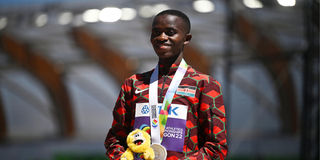Team Kenya’s future dependent on sound grassroots structures

Silver medallist Kenya's Stanley Waithaka Mburu poses on the podium during the medal ceremony for the men's 10,000m during the World Athletics Championships at Hayward Field in Eugene, Oregon on July 17, 2022.
What you need to know:
- Our devolved government units are putting in the effort, with each one developing its plan, and occasionally coming together to align for a common goal, such as the organisation of the annual Kenya Youth Inter-County Sports Association
- We need to focus on four key areas: funding, improvement of facilities, wider access to physical activities and education around the benefits of sport and physical activity
- Bringing together all counties in a sports extravaganza is not only for competition and talent identification, but in the spirit of fair play and inclusion, contributes a lot in development through sports
In 482 days, Team Kenya will make its entry to the French City of Paris for the 33rd edition of the Summer Olympic Games, and in the 17 days of sporting extravaganza, fans and citizens back home will be cheering on the athletes in the hope for some medals.
This event is the epitome of elite sports, but is it understood that the pathway to getting to this elite club is rigorous and resource laden. For one to begin this path, it must start somewhere, and this is usually at the structures set up at grassroot level. This can work more effectively with a national sports policy. What a national policy does is to give a common vision and uniform implementation guide for the country to adopt in the direction they would like their sports to take.
Our devolved government units are putting in the effort, with each one developing its plan, and occasionally coming together to align for a common goal, such as the organisation of the annual Kenya Youth Inter-County Sports Association.
The event that will be held this year in Tharaka-Nithi County targets young players who might have missed out during the mainstream scouting opportunities and those in local county leagues, who may have missed out on an opportunity to join institutions to continue developing their talent and so missed out on elite clubs.
I have previously written on how governors can support the development of sports and this is just one of them. We need to focus on four key areas: funding, improvement of facilities, wider access to physical activities and education around the benefits of sport and physical activity.
Facilities and equipment are a major challenge. To encourage participation, counties need to device ways to make available basic and multi-use sports infrastructure, and low-cost sporting equipment.
Bringing together all counties in a sports extravaganza is not only for competition and talent identification, but in the spirit of fair play and inclusion, contributes a lot in development through sports. It is therefore very encouraging to see county governments putting investment in sports which the National Olympic Committee highly encourages since this is where the future Olympic stars will be born.
NOC-K is committed to making its contribution in the overall sports development in the country by working with the devolved governments in areas of technical development.
Knowledge exchange is particularly important, and forums and trainings with relevant stakeholders in an effort to facilitate coordination will achieve these objectives. This is in addition to providing expert knowledge from around the world on economical but highly efficient sports facilities development.
The dream of having very competitive county sports teams that are well-resourced is not far-fetched, as long as there is increased understanding of their pathway amongst policy-makers and key stakeholders.
Mutuku is the Secretary General at the National Olympic Committee of Kenya.




